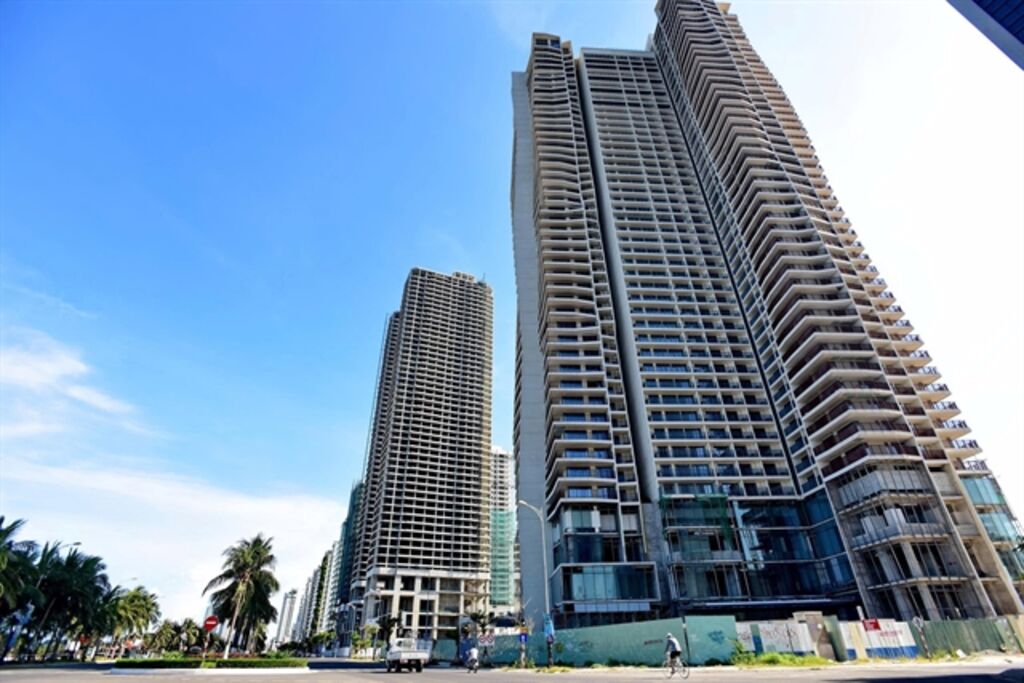 |
| A condotel, hotel project in Da Nang. Commercial service land is where real estate assets bring stable and efficient cash flows, such as financial, retail and accommodation complexes__Photo: VNS/VNA |
A comprehensive legal framework for the management and use of commercial and service land in order to unlock its potential as a critical resource to drive the country’s socio-economic growth needs to be developed, experts have said.
Commercial service land has doubled in size over the past decade, from 25,000 hectares to nearly 50,000 hectares, demonstrating its growing role in the economy, according to Pham Ngo Hieu, deputy director of the Department of Land Management under the Ministry of Agriculture and Environment.
However, existing policy bottlenecks continue to hinder its full potential, experts said at a forum co-organized by Vietnam Real Estate e-magazine and Vietnam Real Estate Research Institute late last week.
According to President of the Vietnam Real Estate Association, Nguyen Van Khoi, commercial service land has significant potential. This is the type of land where vibrant economic, social centers are formed.
In the context of digital economy, tourism, logistics, international education and high-quality healthcare which are becoming new growth pillars, commercial service land is an indispensable foundation for the formation of specialized functional areas, attracting foreign direct investment (FDI), shifting supply chains and creating new economic models, Khoi said.
From the economic perspective, commercial service land is where real estate assets bring stable and efficient cash flows, such as financial, retail and accommodation complexes with better profitability than pure residential real estate and not creating pressure on social infrastructure.
Sharing the same viewpoint, Hoang Van Cuong, member of the National Assembly’s Economic and Financial Committee, said that commercial service land creates significantly added value for the economy, promotes production, create jobs, contributes to the State budget and creates vibrant economic centers.
He emphasized that commercial service land plays a very important role in the country’s socio-economic development.
As the Law on Land is being amended, it is necessary to have a more objective view, Cuong said, adding that there have been a lack of proper understanding about commercial service land, which together with legal problems are hindering the development and use of this type of land.
A paradox is that most commercial service land is located near prime locations such as sea frontage, central areas and tourism areas with high volume of traffic but encountering obstacles, causing numerous projects to be deserted or exploited ineffectively.
Vo Nhat Lieu, CEO of real estate service company Propiin, said: “Many investors are still very cautious when deciding to invest in commercial service land projects because they are not sure whether the business model will really be effective on this type of land or create good cash flow.”
Nguyen Kiet from real estate developer Bcons Group said there are many difficulties when implementing commercial service projects. Specifically, unclear legal information makes customers hesitant to make purchase decisions. Investors are concerned that commercial service apartments will not be granted house ownership certificates, or it will only be for 50 years.
Le Dinh Chung, general director of SGO Homes told the forum that there are many cases where even though the project has been completed, the products cannot be sold to the market because of the inability to issue ownership certificates for buyers as the certificates cannot be separated.
Nguyen Le My Hung, regional executive director of real estate developer Novaland, said the development of a national data center on real estate market is important to ensure transparency and accuracy.
Bui Van Doanh, director of the Vietnam Real Estate Research Institute, said: “Improving the legal framework for commercial service land is critical. It's a strategic move to remove institutional deadlocks and unleash land potential for the service sector, which will be Vietnam’s main growth engine in the coming years.”.
According to Clause 5, Article 5 of Decree 102/2024/ND-CP detailing the types of land in the group of non-agricultural land, commercial and service land is land for the construction of business facilities, services, trade and other structures serving business, services, trade; accommodations, services for golfers; headquarters, representative offices of economic organizations; land for warehouses, storage of goods for economic organizations not belonging to production areas; beaches associated with business, service facilities.- (VNS/VLLF)









